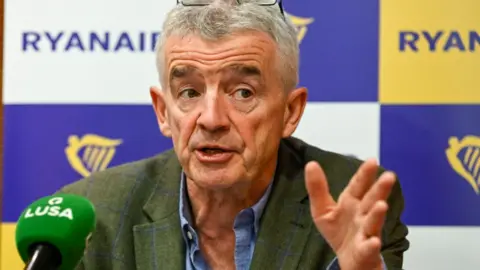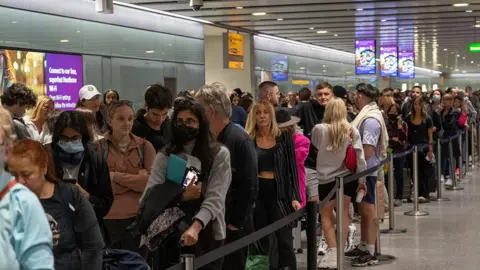Ryanair's Michael O'Leary wants 'practical' immigration approach
 Getty Images
Getty ImagesRyanair boss Michael O'Leary has urged the UK government to take a more "practical, common sense" approach to post-Brexit policy, to allow more workers from Europe to fill vacancies.
Mr O'Leary said he could hire people from continental Europe for jobs that he cannot fill with British workers, but is unable to get visas for them.
Facilitating such visas would help ease disruption to air travel, he said.
The government said it wanted firms to invest in workers from the UK.
'Bizarre situation'
Mr O'Leary said: "I can hire thousands of people in Portugal, in Italy, France, Germany at exactly the same wages that I'm paying in the UK and I just can't hire them in the UK at the moment.
"And we have this bizarre situation at the moment that in the UK I can get visas to bring Moroccans to come in and work as cabin crew. But I can't get visas for Portuguese or Italians or Slovakian youngsters. We just need a bit of more common sense and a practical approach to how we implement Brexit," he told BBC Radio 4.
He said enabling such visas would help ease the disruption currently being felt at some airports, and ease skill shortages in other areas.
"There are not enough people in the UK willing to do these jobs… particularly during peak periods of the summer and airports in particular. Airport handling staff and airport security staff are really struggling to recruit, particularly in the southeast, at airports like Gatwick, Heathrow and Manchester."
Mr O'Leary has made clear his disagreement with Brexit but says he respects the decision to leave the EU.
A government spokesperson said: "Leaving the EU enabled us to introduce a points-based immigration system and we want to see employers make long-term investments in the UK's domestic workforce, such as training, wage increases and better career options, instead of relying on labour from abroad."
Industry disruption
Despite currently facing industrial disputes in France, Belgium and Spain over pay and conditions, Ryanair has suffered the least disruption and cancellations of major European carriers in recent months.
In the first six months of 2022, Ryanair cancelled 0.3% of flights, compared with British Airways' total of 3.5%, and Easyjet's 2.8%, according to air travel consultancy OAG.
Ryanair's chief claims that reflects the "strong balance sheet" the airline had going into Covid, which allowed the company to keep staff on, albeit on reduced pay, and maintain training at the height of the pandemic so that they were able to resume operations swiftly when restrictions were lifted.
 Getty Images
Getty ImagesMr O'Leary believes relaxing restriction on movement of EU workers across industries facing skills shortages would keep costs lower and so keep prices down for consumers.
"People want good service, they want low prices. And we need a competitive economy for that. It is simply not acceptable to turn around to the vast majority of the British people and say, with nobody to pick or to harvest the food, 'please pay 20% higher food prices.'"
Critics say that allowing for a wider pool of workers, however, keeps wages down.
And the Department for Transport has previously noted that there has been disruption in many countries due to staff shortages. "It is not obvious that reaching for the lever marked 'more immigration' will solve the problem," it said.
The Ryanair boss concedes that some travellers are likely to face more disruption over the summer but says that should settle down after the peak period.
"I think everybody would be able to staff up and gear up on time as long as we don't have any adverse Covid developments."
You can hear more on this on Radio 4's Analysis programme: Is the UK the Sick Man of Europe? at 21:30 BST on Sunday, 24 July or available now on BBC Sounds.
